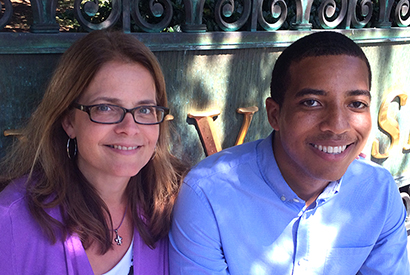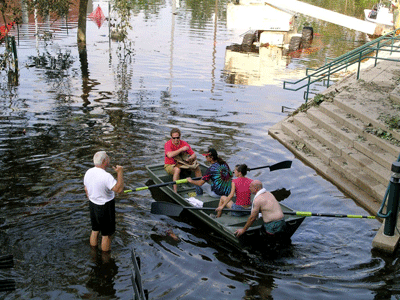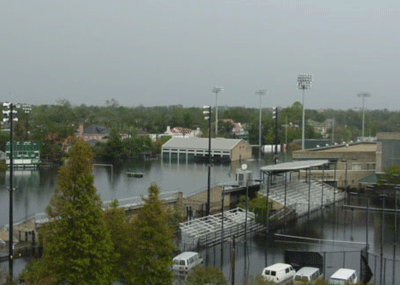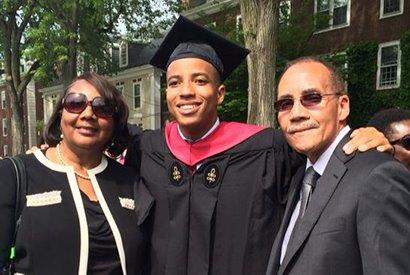Throwback Tuesday: Berkeley welcomed Katrina-displaced students
After the levees broke, dozens of Southern students -- many arriving without belongings -- attended UC Berkeley. The experience changed one young man's life.

September 8, 2015
Ten years ago today, 75 college students displaced by Hurricane Katrina began arriving at UC Berkeley, many with only the clothes on their backs. Here, they continued their studies for a semester, until their schools reopened. Among them was Tulane University sophomore Broderick McClinton, now 28, who recently reminisced about the experience with Berkeley News and Esther Gulli, Berkeley’s executive director of government and community relations. Gulli led the effort to bring the students to campus and managed a flood of compassion and support.
Hurricane Katrina hit southeast Louisiana on Aug. 29, 2005. Where were you at the time?

Esther Gulli and Broderick McClinton today, 10 years after Hurricane Katrina. (UC Berkeley photo by Gretchen Kell)
Broderick McClinton: I rode out the storm with my family in Baton Rouge. I had moved into my dorm at Tulane a few days earlier to help with new student orientation, and in the middle of freshman move-in day, the university issued the order for everyone to evacuate. So, I packed an overnight bag and made what turned out to be an eight-hour drive to Baton Rouge. It usually takes an hour and a half.
I had been through hurricanes before, but this one was different. You kind of felt it was going to be really, really bad. Even the local newscasters were using the word “catastrophic.”
Esther Gulli: I was working in Student Affairs as the chief of staff. Like many people around the world, I remember watching the aftermath of the levee breaches on TV and feeling helpless. I’m not from New Orleans, but I had family there — my father and brothers went to Holy Cross School in the Lower 9th Ward. In the days after the storm, I recall there was discussion of sending a Cal Message to students from Louisiana, Mississippi and Alabama, and I said, “We have to do something more than that!” The admissions office already was getting calls from displaced college kids looking for schools to let them in.

Former Tulane University President Scott Cowen gives directions to hurricane survivors outside the student rec center on the school’s flooded uptown campus. (Photo courtesy of Tulane University)
What happened next?
McClinton: The first day or so was a blur and is hard to put into words. Over the course of a few days, the whole region experienced a level of destruction no one could have imagined. The city was largely destroyed, and its hundreds of thousands of residents were devastated. Neighboring cities, like Baton Rouge, doubled in size as they took in people like myself who were fleeing the storm. And, of course, I no longer had a school to attend.
Tulane was flooded by 10 feet of water, and the school would be shut down for the foreseeable future. Just as did every college student in the city, I had to figure out what to do next. This was even more difficult as we didn’t have access to transcripts or records.
At first, I thought I’d try to go to Louisiana State University, and I spent countless hours in line to register for classes. But then I found out that several universities around the country were opening their doors, and with an uncle in San Jose, I wound up talking to Berkeley. I never thought anything would happen until I got a call from Evera Spears in the admissions office. Evera was amazing, and you could see Berkeley was trying to find a way to make it work. So, two days later I ended up on a flight to Oakland.
Gulli: My boss, Vice Chancellor Genaro Padilla, was totally on board with doing something big. He pitched the idea of hosting students affected by Katrina to Chancellor Birgeneau, who gave an immediate green light. A working group of about 20 of us hammered out the details. The admissions office already had a lengthy list of displaced students looking for a spot. Our criteria were pretty basic — students needed a California connection, we needed courses available in their fields of study and they had to arrive by Sept. 6, right after Labor Day. School already had started here two weeks earlier.
Most of those who came were Californians who attended one of five schools — Tulane, Loyola, Xavier and Dillard universities and the University of New Orleans. Thirty-five were undergrads, the rest were graduate students, most in law and public health. When we took them in, we didn’t know how long they’d be with us, but we assumed at least a semester, until their schools reopened. They paid tuition and fees to their home institutions and came here under “visiting student” status.
What kind of transition did the visiting students experience?

Tulane University’s tennis courts and football practice fields after the levees broke. The school suffered more than $650 million in damage and losses from Katrina. (Photo courtesy of Tulane University)
McClinton: It wasn’t easy, given all that had happened. I had family members, cousins, who had lost absolutely everything and who were staying with my parents. A lot of my friends who grew up in New Orleans were devastated, and they really didn’t know what to do.
After my plane landed, a cab driver dropped me off on Telegraph Avenue, and that was my first shock. UC Berkeley was way bigger than Tulane — we had only 6,000 or so undergraduates there. But the people at Berkeley helped us have a great experience. I stayed in Unit 3, got involved in a number of clubs and made numerous friends. You guys sure have a hard political science program, but the poli sci professors were amazing!
Gulli: We scheduled a three-hour orientation in MLK. Reporters were outside, anxious for interviews. I’d made cookies — they were chocolate no-bakes, with oatmeal and peanut butter. What’s funny is that I thought all the work leading up to getting the students here was going to be the hard part, but it was only the beginning. Most of them showed up with nothing, no extra clothes, no books, no toiletries.
Once word got out we were doing this, the campus was overwhelmed with donations — clothing, offers of free housing, household goods, gift cards, money. We had to set up a mechanism for receiving all this and allocating it to students. It got a little crazy at times. But thanks to the generosity, we were able to provide free meal cards, free books and supplies, gift cards from Gap, Levi Strauss & Co. and Longs Drugs, free parking passes from the city for those with cars, free football tickets, emergency loans of up to $2,000, loaner computers for the semester, free eye exams and glasses, free Rec Sports Facility memberships. We even had enough money left over to purchase each student a Southwest Airlines gift card to fly back home at the end.
Looking back, how did that semester affect your lives?

Broderick McClinton on graduation day from Harvard with his parents, Marjorie and Flandus McClinton. (Photo courtesy of Broderick McClinton)
McClinton: Berkeley definitely played a pivotal role in my professional career. I joined the Haas Undergraduate Black Business Association, HUBBA, and the HUBBA president introduced me to a program called Sponsors for Educational Opportunity that strives to increase the number of minorities on Wall Street. I ended up getting accepted into the program and being placed in an internship at BlackRock, one of the larger players in the investment industry. After interning there, I worked at BlackRock for four years and then went to Harvard Business School. People at Berkeley played a significant role in setting me up for these opportunities, and for that, I’m grateful. I’m now back in Berkeley running my own company, OwnersCircle, which connects accredited investors to established small and medium-sized businesses.
I root for you guys all the time in sports, and I still keep in touch with people I met during my time here. I recently did an hour-long walk around campus reminiscing. I walked by Unit 3, and to some of the auditoriums where I had classes, and around Sproul Hall. It brought a lot of good memories back. I feel like I’m a part of this place.
Gulli: Professionally, the experience was very rewarding, and all-consuming. It felt good to be helping. The team of people working on the project was just amazing. Everyone worked long hours, came together with a sense of purpose and did whatever they could to help. It was great getting to know people from all different areas across campus, from academic advisers to engineering professor Bob Bea, an expert on the Katrina levee breaches. I’m also incredibly proud of the hundreds of Berkeley students who decided to keep helping New Orleans through the Magnolia Project, which is going on its 10th year.
The semester with the Katrina students also left me with the realization that we need a plan for our own students when an earthquake hits the Bay Area. You can have all the best-laid plans, but we’re going to need help. It’s all about karma, baby. You pay it forward, and it will come back someday.